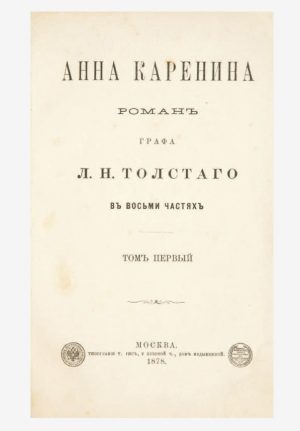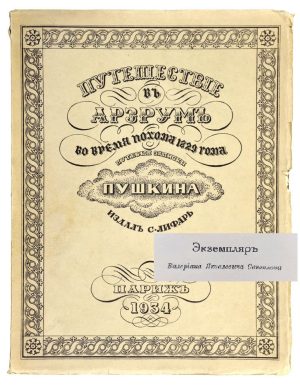Our Notes & References
The first book edition of this masterpiece of 20th-c. world literature, following serialization in two issues of the journal Moskva in November 1966 and January 1967.
“Reading Bulgakov’s satire of 1930s Stalinist Moscow [shows] … just how easy it is to mess up a nation psychologically” (Viv Groskop, The Guardian, 2014).
“The Master and Margarita is yet another masterpiece that came at an unexpected time from an unexpected source” (Victor Terras, A History of Russian Literature, Yale UP, 1991).
The story of creation and publication of Master and Margarita is one of the most tragic in world literature, epitomising the writer’s doomed fate under the totalitarian regime. Bulgakov began working on the novel in 1928; already in February 1929, an agent of Joint State Political Directorate (OGPU, the secret police of the Soviet Union from 1923 to 1934) reported: “Bulgakov wrote a novel, which he read among certain people, who told him that they would not publish it, it is too bold” (our translation from the quote in Sokolov). In March 1930 Bulgakov, whose plays and other works were banned, was facing unemployment and starvation: in his famous letter to the Soviet government he confessed to burning a draft of “the novel about the devil” and begged to be allowed to emigrate.
Bulgakov’s request was denied, but a month later he received a call from Stalin himself, who allowed the production of Bulgakov’s play “The Days of the Turbins”. The persecution of Bulgakov in the Soviet press continued, however. In 1937-38 Bulgakov resumed his work on MaM, but in 1940 he died while dictating the final corrections, broken morally and physically. He was only 49.
The novel has two settings. The first is Moscow during the 1930s, where Satan appears at Patriarch’s Ponds as Professor Woland. He is accompanied by Koroviev, a grotesquely dressed valet; Behemoth, a black cat; Azazello, a hitman; and Hella, a female vampire. They target the literary elite and Massolit, their trade union. The second setting is the Jerusalem of Pontius Pilate: Pilate’s trial of Yeshua Ha-Notsri (Jesus of Nazareth), his recognition of an affinity with (and spiritual need for) Yeshua, and his reluctant acquiescence to Yeshua’s execution. The Master, Bulgakov’s alter ego, is an author who wrote a novel about the meeting of Pontius Pilate and Yeshua. The novel is rejected by the Soviet literary bureaucracy, ruining his career. He is “detained for questioning” by the secret police.
In MaM, magic and the supernatural are elevated to the level of historical truth. In Chapter 1, Woland introduces himself as a “specialist in black magic”, invited by the Soviets to decipher manuscripts of Pope Sylvester II, originally known as Gerbert of Aurillac, allegedly an alchemist who had relations with a succubus. References to other famous magicians, alchemy and masonic symbols are scattered throughout the novel. For example, Woland’s performance in Chapter 12 (titled “The Black Magic and Its Exposure”) is based on the actual performance of Harry August Jansen, a Danish-born entertainer settled in the US. He travelled the world as a professional magician; Bulgakov saw him performing in Moscow in 1928, dressed up as Mephistopheles.
The magician is only one of the incarnations of Bulgakov’s Prince of Darkness. In Woland’s appearance, one can see features of several famous magicians of the past, including Count Cagliostro (the alias of the occultist Giuseppe Balsamo) and the Comte de Saint Germain, an alchemist and philosopher. The motif of a pact with the devil, central to Faustian literature, also plays a key role in the novel: Margarita surrenders her soul to Woland for a chance of being reunited with the Master.
Another particular interest of this edition is the introduction written by Archbishop Ioann San-Frantsisskiy (1902-89), a Bishop of the Orthodox Church in America and a talented writer, from the Shakhovskii noble family. This preacher wrote prophetic words about Bulgakov’s mystical novel: “О книге Булгакова будут писать. И о ней не легко будет писать тем, кто станет писать” [Many will write about the Bulgakov’s book. And it won’t be easy to write about it for those who will” (our translation).
Like in the serialization, the text of this edition is partly censored; the full text in Russian will appear in Frankfurt two years later, in 1969.
Provenance
Robert Eden Martin (b. 1940; American lawyer and noted collector of Russian, British and American literature works).
Bibliography
Sokolov B. ‘Rasshifrovannyy Bulgakov. Tainy «Mastera i Margarity»’. Eksmo, 2020.
Belobrovtseva I. Kulius S. ‘Roman Mikhaila Bulgakova «Master i Margarita»: opyt kommentariia’. Tallin, 2004.
Physical Description
Octavo (24 x 16 cm). 219 pp. including first blank, half-title, title, and preface.
Binding
Publisher’s grey wrappers printed in black and red.
Condition
Light stains to the upper wrapper, spine a bit worn and darkened.














